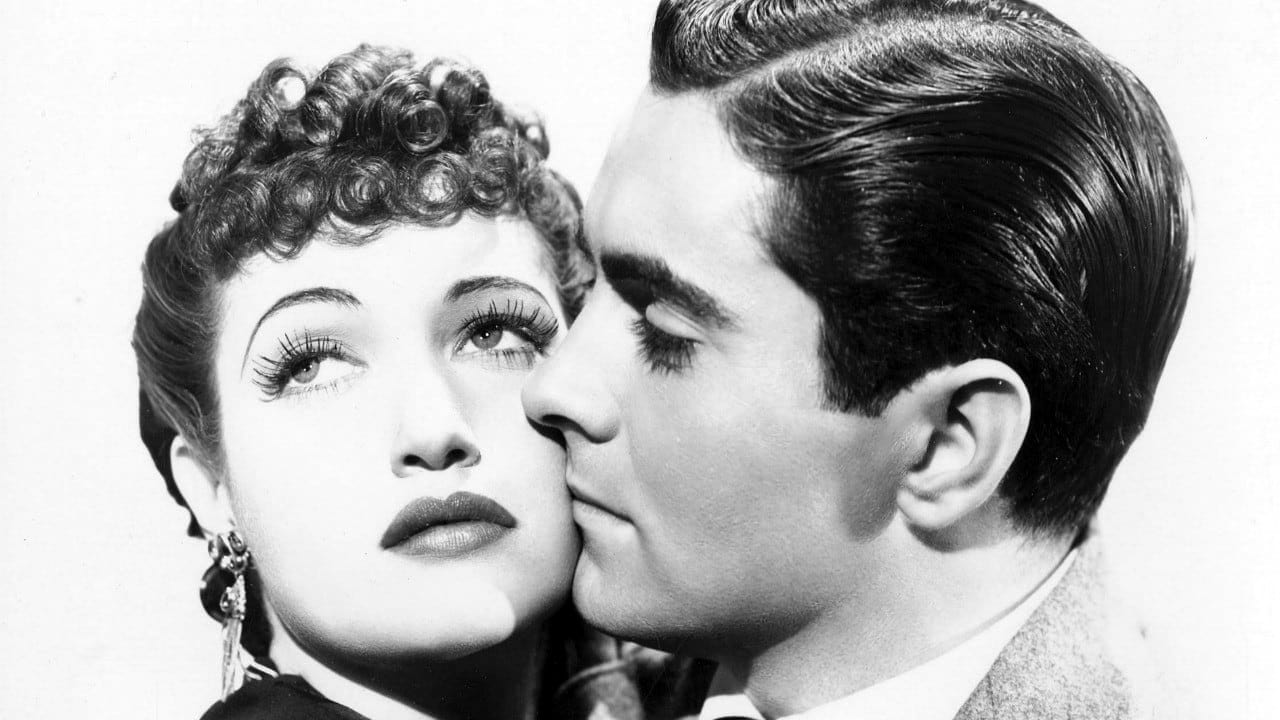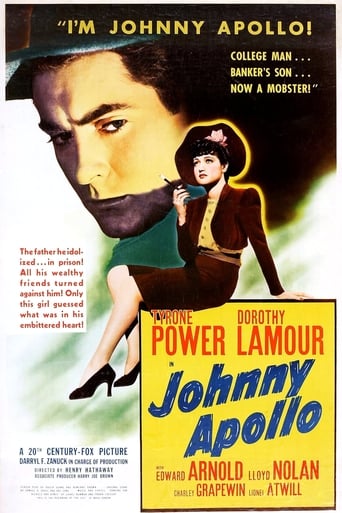

This movie is the proof that the world is becoming a sick and dumb place
... View MoreVery interesting film. Was caught on the premise when seeing the trailer but unsure as to what the outcome would be for the showing. As it turns out, it was a very good film.
... View MoreWhile it is a pity that the story wasn't told with more visual finesse, this is trivial compared to our real-world problems. It takes a good movie to put that into perspective.
... View MoreThrough painfully honest and emotional moments, the movie becomes irresistibly relatable
... View MoreWall Street millionaire Edward Arnold (as Robert Cain Sr.) is indicted for embezzlement and goes directly to jail. Canoeing in his swim trunks, college student son Tyrone Power (as Robert "Bob" Cain Jr.) is shocked and disappointed. He disowns his dad and drops out of school. Now a convict's son, Mr. Power finds himself unable to find honest work. While waiting to see alcoholic lawyer Charley Grapewin (as Emmett T. Brennan), Power meets attractive Dorothy Lamour (as "Lucky" Dubarry) and paroled gangster Lloyd Nolan (as Mickey "The Mick" Dwyer). Power assumes the name "Johnny Apollo" and drifts into a life of crime...This story is too loosely plotted, but not in a way that makes it difficult to follow...Helping immensely is that the film is great looking, and directed exceptionally by Henry Hathaway. The black-and-white cinematography is especially noteworthy; photographer Arthur Miller might have received his annual "Academy Award" nomination for this one, if the studio wasn't backing him in "The Blue Bird" (1940). Then Fox' biggest star, Power shows he might have accomplished the same feat at MGM or Warner Bros. Singing and "Dancing for Nickels and Dimes", Ms. Lamour is luscious, especially in a leggy skirt and clinging top. Dependable supporting actors like Mr. Nolan and Mr. Grapewin get juicy parts, too.******* Johnny Apollo (3/15/40) Henry Hathaway ~ Tyrone Power, Dorothy Lamour, Lloyd Nolan, Edward Arnold
... View MoreAnother reviewer used the label 'pre-noir' and I think it is a fitting description. 'Noir' is an elusive term and means different things to different viewers, but "Johnny Apollo" doesn't fill the bill in any case. No aura of menace, no expressionist lighting effects, no ambiguity of purpose in the hero's intent, to name a few qualifications. But those are some of my own prerequisites.Having said that, "Johnny Apollo" is a good pre-war crime drama with an attractive cast and an excellent script. The film works on its own terms and the players are so competent you can almost overlook the hastily-contrived ending which strains the viewers credulity. Edward Arnold, Dorothy Lamour and Tyrone Power are first-rate, although Arnold is the workhorse here and Power was a questionable choice for the title role, try as he might, and he did try. But as with Gary Cooper in "City Streets", Power is not a gangster. There are lots of familiar character actors and Dorothy Lamour gets to sing a few songs in her husky voice, and "Beginning Of The End" is a gorgeous song hardly heard at all these days.But what was the big rush to end the picture? As it was, there was an awful lot to swallow with multiple plot holes and loose ends. And the light-hearted last scene didn't fit. I still give it a rating of 7, as I just went with it as an enjoyable example of pre-WWII escapist entertainment.
... View MoreI found this to be a fairly interesting crime story, the emphasis being more on the story and less on the action. What little action there is takes place at the end of the movie. Lloyd Nolan plays a low-key gangster and Tyrone Power plays a guy who exhibits good and bad. Dorothy Lamour, Edward Arnold, Charley Grapewin and Lionel Atwill all add to this talented cast. Lamour's tough-talking "dame" character and good cinematography helped this movie be characterized as a very early entry into the film noir genre.The problem with the movie was the believability of the story. There were too many unanswered questions in here. Why was this person arrested? How and why could this happen, and that? There are lots of holes in here and sometimes they were so prevalent they broke up the continuity of the story. Okay for one curious look but not worth a purchase, although it's still not available on DVD anyway, and few people buy new VHS tapes anymore.
... View MoreTyrone Power plays privileged young man Bob Cain, Jr., who adopts the nom de guerre Johnny Apollo when he takes to a life of crime. (Incidentally, this movie thus kicks off a string of at least a dozen crime stories of the 40s and 50s named Johnny Something-Or-Other: Eager, O'Clock, Stool Pigeon....) Power chooses crime to spite his father (Edward Arnold) by emulating his dog-eat-dog ethics, for financial tycoon Arnold has been sent to prison for embezzlement, causing a rift between the generations. After Power's initial snit over Dad's letting him down, his attempts to secure him an early parole lead, though `connected' shantoozie Dorothy Lamour, to the underworld. The muscles he developed rowing crew in the Ivy League stand him in good stead as muscle in the mob, for soon he becomes a trusted lieutenant in Lloyd Nolan's crime family (plausibility is not the movie's long suit). But Pop (who has reclaimed his spiritual center in the Big House by welding boilers) disowns his namesake when he learns of his new line of work. In due time, of course, Power ends up behind those bars as well. But that's far from the end of the tale....The plot of Johnny Apollo, a major production, takes a few turns too many but manages to keep a just-passable amount of credibility. Though Power, in the lead, stays less than persuasive as a menacing mobster he's too much of a pretty-boy, and lacks the acting resources to turn himself into a pretty-boy psychopath the rest of the cast compensates. Predictably, Arnold is good, as is, in the role of a mob mouthpiece with a weakness for Scotch-and-milk, Charlie Grapewin (whose first film credit falls in the last year of the 19th Century!); the two seem to be vying for title of America's sweetheart, old-codger division. Best of all is Lamour, with her sad eyes and fetching pout, who leaves an impression here of a skilled actress, more than she managed in all the Hope-Crosby `Road' pictures put together.Direction is by Henry Hathaway, an uneven craftsman who nonetheless rose to the occasion for a handful of movies; this can be counted among his stronger efforts, along with The Dark Corner, Kiss of Death, Fourteen Hours and Niagara. But Johnny Apollo cleaves more closely to the crime melodramas of the previous decade than to the unsentimental and ambiguous style soon to come. But, in it, one can nonetheless sense particularly in its heavily shaded photography the birth pangs of film noir, struggling to come into the world.
... View More